Tabi wa michizure
Yo wa nasake
In travelling, a companion.
In life, compassion.
In travelling, a companion. My recent travels have been both enjoyable and tiring, mostly being to do with struggling for academic tenure. This is the nature of travel. My companion, twofold: being my family, and, today, this particular tea.
In life, compassion. It is the same spirit in both clauses, and is one of my favourite sentiments in Japanese. When the proverb says "compassion", they mean it in the same sense as did 達磨 Daruma (Bodhidharma). It is a special kind of compassion.
The tea-table is becoming something of a rare event, but one that therefore holds an ever-increasing hold over my affections. To sit at the tea-table is to travel, through going nowhere. In a humble life packed to the brim with tiny details, some trivial, some not-so-trivial, the tea-table represents both solace and travelling.
It is not by accident that we end up with this particular companion for my travel today, because it is a cake most kindly provided by the fathomless generosity of dear Keng, from Singapore. One day, I would very much like to go that country and spend an afternoon in a teashop with my friends there. As I sat in the common room of my college with another Singaporean friend, who was visiting last week, I realised that he was the only one of my Singaporean friends whom I had actually met.
Actually, now I come to think of it, I did once have tea in the common room of my old college with the wife and daughter of another Singaporean tea-friend, who were passing through on the way to the daughter's nearby university town. We drank lapsang souchong, I recall. A good one.
When the weather outside is simultaneously snowing and raining, and the house is cold, some degree of warmth and comfort is required. At the tea-table, I wrap myself in two heavy blankets, looking rather like an old man. My cold hand extends from the folds of the blankets to manipulate the kettle and teapot.
On such a day, my spirit demands the warmth of hongcha. This cake, pictured above and below, is made of pu'ercha tips, and yet has a character very similar to pu'ercha. Such is the degree of similarity, in flavour, colour, and aroma, that I wonder if some hongcha methods have been used in its production. This is all in its favour, because the result is splendid indeed, and fits perfectly into the chill of the February morning.
This is a tea that demands to be touched. It is flexible, and bends laterally. It becomes apparent that the pu'erdao, pictured below, is entirely unnecessary. Though the leaves have been compressed, there is little that holds them together, and they may be crumbled free of the bing using the fingers.
Perhaps it is obvious to most people, but I have just recently, over the last year or so, come to appreciate the great significance of other people in one's life, and the dramatic effect that their support provides. In many ways, I have come to appreciate how entirely dependent my life is on the goodwill of others. During the on-going tenure process, this has become sharply focussed and completely obvious. It is, really, only by the good graces of others that I can be said to have attained anything of value. When I was a young undergraduate, I thought that it was solely one's own devices that were of importance. How long it takes to unlearn that lesson, and to learn the proper humility.
Maybe this is all an integral part of the process. In life, compassion.
Keng's unusual gift turns out to be Just What the Doctor Ordered. Its smooth, slick texture wins me over, while its tangy, somewhat bitter, finish lends it sufficient challenge to wake me, and retain my interest.
Page after page of my diary becomes filled with my odd little handwriting - odd for an engineer, anyway. A colleague came to me after looking through the piles of "anonymous" assessment reports of the students who have applied to study engineering with us next year. "I could tell your reports from your hand-writing." He looked conspiratorial.
We will see what the eventual outcome of the current period of hard work and travelling comes to be. My journey today, at the tea-table, was a long one. My pen ran out of ink. The water jug ran empty. The tea, however, continued undaunted.
Fittingly, its name is "Jinchan", meaning "Golden-mellow". The "Gongbing" part means "tribute [to the Emperor!] cake", which is a standard phrase, much like "Chawang".
If there is a point to today's article, it might be that we must be mindful of the presence of companions and our implicit dependence upon them. Particularly in the tiny world of tea, as in many other worlds, each personality seems to make a very great difference. A gift of compassionate generosity goes a long way, much further than one might otherwise think, and it is with a gratitude that I drink this wonderfully malty, rugged, yet smooth and tippy pu'ercha.
In travelling, a companion.
In life, compassion.

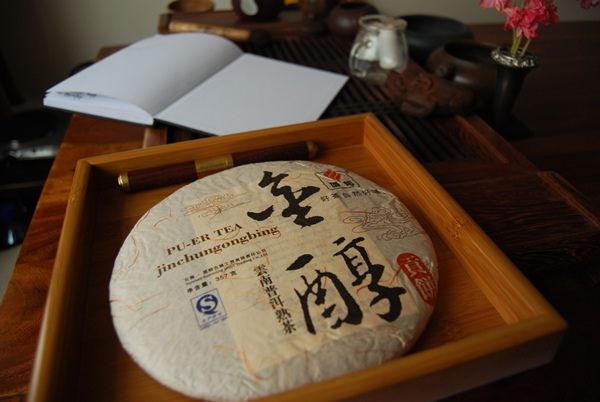
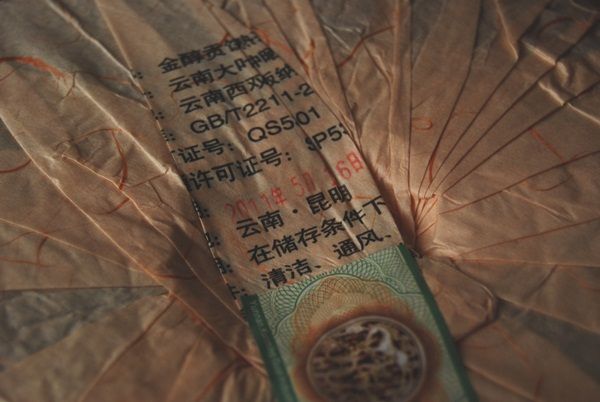
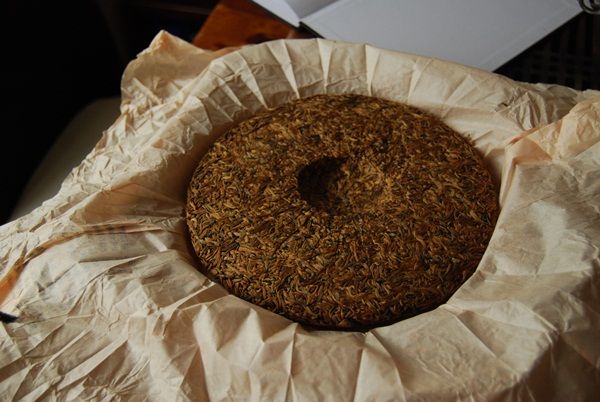
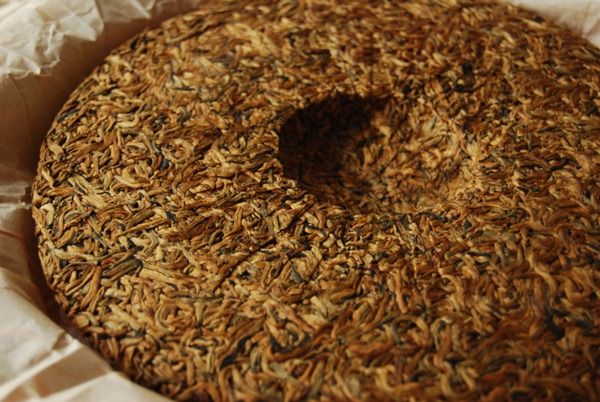
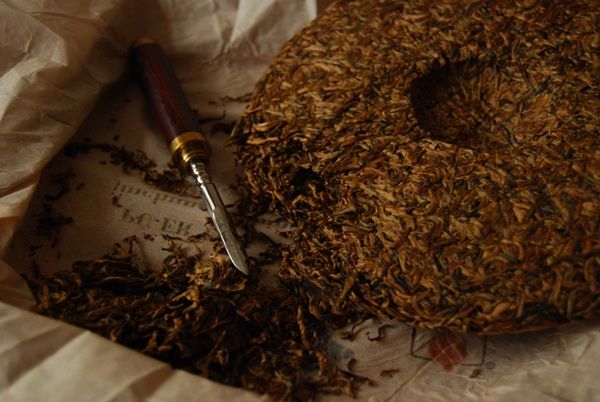
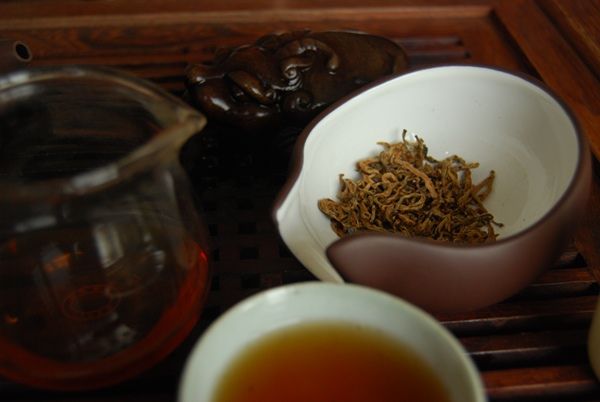
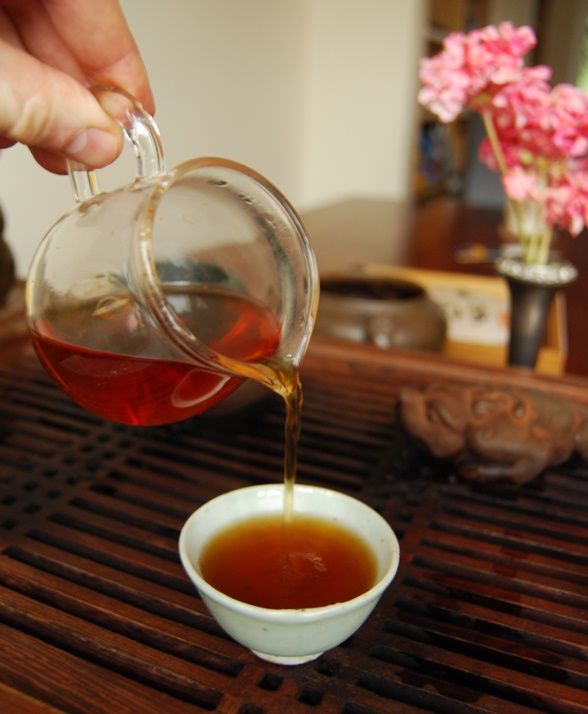
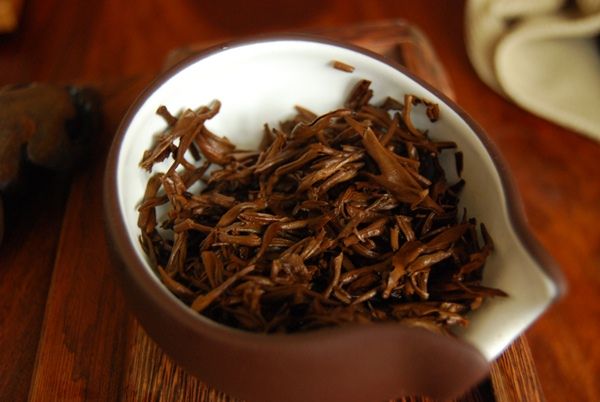
11 comments:
Hobbes,
I'm in total agreement, and find that the preciousness of time at the "table" is inversely proportional to how much time you have to spare.
It's funny that tea bloggers end up writing about the mundane (brew duration, appearance of leaves) as well as the ephemeral (qi and other such sensations) but don't seem to mention the mind/spirit component that frequently. For me, that's arguably the most interesting and memorable part of tea, and both at home and in the many places I have drank tea, I have often gone on such journeys that you speak of, whether actually somewhere else or just within my home or garden, and I know that dual feeling of solace and movement. I can see the effects different leaves have on the state of mind, different patterns of thoughts that they follow, different memories and places and conclusions they wind me through. This is, I think, something that arises very much out of the nature of puer and some oolong; as where, I concluded, after drinking some Japanese Kabusecha recently after a long absence of such green teas, the feeling there is more of a calm mind/sharpness--very much the zazen feeling. Interesting to see the ways cultures shape nature and vice versa, eh?
I've come to similar conclusions about the role of others versus strictly self-determination. Hard to tell where one ends and the other begins, in many cases.
It's a good feeling to have the tea outlast you and the other elements you've brought to make it. I was once talking to a fellow guitarist who had been playing about 25 years more than me, how whatever my skill level, I'm never quite to the point I want to be at, and he said, "That's how it should be until you die."
I think it's kind of like that.
Hi Hobbes, I really enjoyed this article and shared your sentiments about companion and compassion. When I tried this tea some time ago, it smell and taste more of red tea than puerh tea. Nevertheless, I still keep a few bings to see how it will change over time.
Here wishing you and your family a Happy and Prosperous Year of the Snake, and hopefully you will be able to make your way to S'pore soon.
A beautiful lesson on Tea and Life.
Dear Psychonaut,
I am always reminded of the phrase reported by one of Tony Blair's advisors: "We don't do religion." It is apt because Mr. Blair happened to be a man for whom faith is an important part of his private life, but where it was not discussed publically. I recall that Mr. Blair converted to his wife's denomination (Roman Catholicism) shortly after leaving office. For Mr. Blair, this is most likely because he did not want religion to be an issue in his public life. This arises because, certainly in England and much of Europe, matters of spirituality are considered a private matter - it is difficult, and arguably (for us) inappropriate, to raise matters of faith in public.
It has always been the English tradition than one's religion is between oneself and one's god. I notice that this is in stark contrast to the public life of many who hold public office in the USA, where a declaration of faith is an essential component of winning votes. This is entirely alien to most English, and, I would say, many Europeans. Ironically, the constitution of the USA is particularly explicit on the separation of Church and State, whereas the Church of England is actually part of the British Government (in that it is an established church, and where its bishops form part of the upper house of the legislature).
For many, a blog is not the place to go into matters of spirituality - I imagine that it is seen as an irrelevance. I tend to take the view that everything is relevant, though; what we bring to the table is just as important as that which the leaves have to say. We interpret the leaves through our own prejudices and thick layers of filters, and these arise as a consequence of our minds.
That said, and it may be the Englishman talking here, I cannot abide pages of spiritual drivel. Then again, I cannot abide pages of any kind of drivel. Perhaps that's a personality flaw.
Toodlepip,
Hobbes
Dear Keng,
Likewise, 新年快樂 (xin nian kuei le)! I trust that you had an excellent New Year's Eve.
Lei and her sister spent the day preparing our New Year's Eve dinner, which was remarkable. My favourite dish was pork balls made with the (rather famous) sausage meat from my tiny hometown, just outside Cambridge. An unexpected treat, and a great way to see out my Dragon Year.
With best wishes,
Hobbes
Dear Charles,
Too kind; I wouldn't claim to be able to give lessons in anything like such grandiose terms - just notes on my own conclusions. :)
Toodlepip,
Hobbes
Absolutely beautiful, Thank you for sharing this article, it is the most inspiring on this site of which i have come to love so dearly!
Theo
Hobbes,
First off, I guess you can be forgiven for not recognizing odd portmanteaus as you're not the first, but it's actually psychanaut (as in 茶 and 禪), not psychonaut, though I haven't felt compelled to be addressed by internet pseudonyms since at least 2001, so Nick will do just as well.
Second, I have to say I am outraged by your statements, as I drink puer: 1) To lose weight, 2) For enjoyment, and 3) To drive out the Devil and call upon the power of Jesus to smite all unbelievers.
Seriously though--that's now what I meant by mind/spirit at all, though I suppose that's the more conventional thought about spirit as the root word of spirituality and what spirituality is for most people. That norm in much of the US is just as mystifying to me as to you--luckily I live in probably the most godless place in the entire country (yet perhaps most blessed, ironically). Tangentially thinking about the matter, I don't think there is a large country that doesn't have a large and fervent religious population, which I think also tends to be correlated or related to extremes and inequality--also a feature all large countries have. Even though the USA's most direct cultural links are to US and Europe, in many ways, it's economic and cultural spread is closer to one of the larger South American countries. I think we're probably somewhere in the middle between Brazil and China.
I just chose spirit to append to mind to separate in a hazy way from the purely analytical aspect of mind, as the words are sometimes fuzzily used--I could have just as well wrote "an aspect of the psyche."
In any case, I brought it up because I thought this post was a good example of that.
Very kind, Theodore - thanks for reading.
Psychanaut - I'm with your original meaning; I meant that the difficulty of raising matters spiritual in public often prevents it. We are much more comfortable with reading about leaves and brews than we are with feelings of the spirit. :)
Toodlepip,
Hobbes
Hobbes,
Thank you for this fine blog: it has been an inspiration and has helped me over the last few months to start trying out puerh teas. One question: I have been given a (the spent leaves are green, so I assume it is sheng) tuo cha marked xin feng huang and it gives me a weird pricking tingle at the tip of my tongue and on my scalp. Zi Zheng tea on their site says: "when drinking tea, if one experiences any sensation that indicates the use of chemicals; typically tingling or numbing sensations on or near the tongue tip one should neither continue to drink it nor buy it." Yet, others describe such tingling as a normal thing, so I am confused. I have not experienced this with the 3 other puerhs (ripe and raw) that I have tasted before.
Your expert opinion would be much appreciated.
Best regards,
Miratus
Dear Miratus,
Important! Pesticides (prevalent in cheap teas) make the mouth feel decidedly unpleasant. Confusingly, good leaves have a set of sensations which, while obviously different (and very pleasant), share similar descriptive phrases.
A good leaf can cool the breath, and leave a gentle pleasant numbness on the tip of the tongue, much like a pleasant huajiao (flower pepper / Sichuan pepper), if you are familiar with that sensation. Similarly, good leaves are often vibrant and buzzing, and the mouth feels (pleasantly) active after cup. Generally, these sensations all go together.
Pesticides and fertilisers numb and tingle the mouth, but in an aggressive and noticeably unpleasant manner. You simply don't want to drink them.
Pesticides and fertilisers tend to get used on taidicha / plantation tea, where the emphasis is on yield. That isn't to say that it isn't possible to use chemicals on old trees, but, I understand from teamakers that know much more than I, this is unusual - often due to the location and environment of old trees.
Fenghuang products are of reasonable quality, but I can easily imagine plantation leaves and interesting practices making it into their products.
I suspect that I may not have answered your question. :)
Toodlepip,
Hobbes
Post a Comment